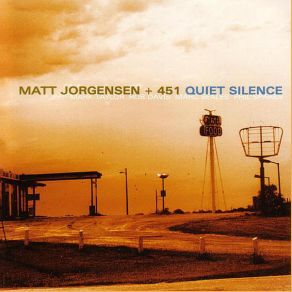Quiet Silence
Download links and information about Quiet Silence by Matt Jorgensen + 451. This album was released in 2002 and it belongs to Jazz genres. It contains 10 tracks with total duration of 55:27 minutes.

|
|
|---|---|
| Artist: | Matt Jorgensen + 451 |
| Release date: | 2002 |
| Genre: | Jazz |
| Tracks: | 10 |
| Duration: | 55:27 |
| Buy it NOW at: | |
| Buy on iTunes $5.99 | |
Tracks
[Edit]| No. | Title | Length |
|---|---|---|
| 1. | Fog | 5:57 |
| 2. | Everything In It's Right Place | 2:49 |
| 3. | Tumbleweed | 7:47 |
| 4. | India | 8:15 |
| 5. | Blessing | 2:38 |
| 6. | Quiet Silence | 9:22 |
| 7. | The Look of Love | 4:51 |
| 8. | Ballad for John | 4:54 |
| 9. | Tomorrow Never Knows | 7:10 |
| 10. | Bonus Track | 1:44 |
Details
[Edit]In his sophomore album, Quiet Silence, drummer Matt Jorgensen shows off an incredible hand at both composing and arranging, as he moves effortlessly through piece after piece mixing the old and the new with his band 451, a collection of busy Seattle players. In what's perhaps been the most notable shift on the album, Marc Seales' usual piano is replaced by a nice Fender Rhodes, which works out surprisingly well under his fingers, as can be noted in his solo in the opening track. A Radiohead number is tossed in second, with much more emphasis on the groove than on any real solos, but the groove is certainly worth hearing here. "Tumbleweed" provides both Seales and bassist Phil Sparks some room to stretch out on their respective solos to good effect, and Coltrane's "India" forms an interesting counterpoint to "Tumbleweed," stepping up the energy remarkably, and allowing the dual sax players to show off their chops. After a contemplative interlude, the band moves into the title track slowly, using the Fender to surprising effect for something of an Eastern flavor when mixed with the bass and horns. It's a highly functional center for the album, making full use of all of the players at all times it seems, and making good use of them at that. A classic Bacharach number follows, played straight with some tenderness not usually afforded to it in other covers. After a Jeff McSpadden piece, the album finishes on the Beatles' "Tomorrow Never Knows," which gives Jorgensen his long-awaited chance to start banging out a fast beat with ornamentation left and right. While not part of the usual jazz repertoire, it makes a nice finish for a very nice album. Throughout the album, all of the performers make standout performances, always anchored and shaped by Jorgensen's drumming work, which can switch from fiery to colorful with ease. Above all, the group as a whole provides a highly enjoyable outing, paying reference to the old and simultaneously branching out a bit into new explorations. Definitely worth listening to.